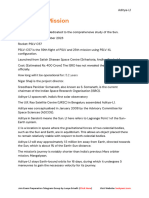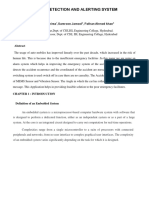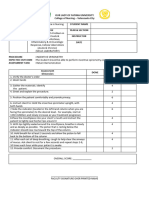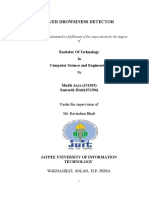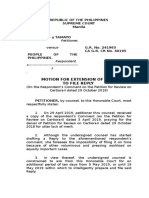Family Law Assignment
Family Law Assignment
Uploaded by
isha04tyagiCopyright:
Available Formats
Family Law Assignment
Family Law Assignment
Uploaded by
isha04tyagiOriginal Description:
Original Title
Copyright
Available Formats
Share this document
Did you find this document useful?
Is this content inappropriate?
Copyright:
Available Formats
Family Law Assignment
Family Law Assignment
Uploaded by
isha04tyagiCopyright:
Available Formats
Family law Assignment
Evidence of conclusive proof
Section 4 of Indian Evidence Act, 1872 deals with three important phrases - "May presume", "Shall Presume" and "Conclusive proof" "May presume" Whenever it is provided by this Act that the Court may presume a fact, it may either regard such fact as proved, unless and until it is disproved, or may call for proof of it "Shall presume" Whenever it is provided by this Act that the Court shall presume a fact, it may either regard such fact as proved, unless and until it is disproved "Conclusive proof" When one fact is declared by this Act to be conclusive proof of another, the Court shall, on proof of the one fact, regard the other as proved, and shall not allow evidence to be given for the purpose of disproving it.
The Concurrent Subject ListMarriage and divorce; infants and minors; adoption; wills, intestacy and succes-sion; joint family and partition; all matters in respect of which parties in judicial proceedings were immediately before the commencement of this Constitution subject to their personal law.l law.
Registration of marriage (Seema v Ashwani Kumar 2006)
Hindu Marriage Act, 1955 - Section 8--Registration of marriages --Marriages of all citizens of India belonging to various religions--Should be made compulsorily registrable in respective States where marriage solemnised--Accordingly, directions issued to States and Central Government. Though most of the States have framed rules regarding registration of marriages, registration of marriage is not compulsory in several States. If the record of marriage is kept, to a large extent, the dispute concerning solemnization of marriages between two persons is avoided. As rightly contended by the National Commission, in most cases non- registration of marriages affects the women to a great measure. If the marriage is registered it also provides evidence of the marriage having taken place and would provide a rebuttable presumption of the marriage having taken place. Though, the registration itself cannot be a proof of valid marriage per se, and would not be the determinative factor regarding validity of a marriage, yet it has a great evidentiary value in the matters of custody of children, right of children born from the wedlock
of the two persons whose marriage is registered and the age of parties to the marriage. That being so, it would be in the interest of the society if marriages are made compulsorily registrable. The legislative intent in enacting Section 8 of the Hindu Marriage Act, 1955 is apparent from the use of the expression for the purpose of facilitating the proof of Hindu Marriages. As a natural consequence, the effect of non- registration would be that the presumption which is available from registration of marriages would be denied to a person whose marriage is not registered. Hence marriages of all persons who are citizens of India belonging to various religions should be made compulsorily registrable in their respective States, where the marriage is solemnized.
You might also like
- 2 REDEMPTION TENDER OF PAYMENT OFFERING Verizon Original Sample??Document10 pages2 REDEMPTION TENDER OF PAYMENT OFFERING Verizon Original Sample??D Moor100% (11)
- Micro Teaching Is A Best Example For SimulationDocument2 pagesMicro Teaching Is A Best Example For SimulationdelnaNo ratings yet
- (DIgest) Vestil v. IACDocument2 pages(DIgest) Vestil v. IACTrixie Mariano100% (7)
- 4.1 Judge Martonino R. Marcos v. Hon. Perla v. Cabrera-Faller A.M. No. RTJ-16-2472 January 24, 2017 DigestDocument2 pages4.1 Judge Martonino R. Marcos v. Hon. Perla v. Cabrera-Faller A.M. No. RTJ-16-2472 January 24, 2017 DigestSarah Jean DadoNo ratings yet
- Study of Application and Adverse Effects of Pesticides On Human HealthDocument30 pagesStudy of Application and Adverse Effects of Pesticides On Human Healthbiditharyal6No ratings yet
- DemonetizationDocument27 pagesDemonetizationSuman PoudelNo ratings yet
- Adolescent Development - Assignment 2Document3 pagesAdolescent Development - Assignment 2api-3576446830% (1)
- Road Divider ReportLDocument88 pagesRoad Divider ReportLKrina Parekh100% (1)
- Project Report: Bharti AirtelDocument45 pagesProject Report: Bharti AirtelSahil SethNo ratings yet
- Aditya-L1 MissionDocument8 pagesAditya-L1 MissionVeeraVenkataSaiDurgaPrasad GubbalaNo ratings yet
- PJDocument51 pagesPJRasel AlamNo ratings yet
- RF Based Home-AutomationDocument58 pagesRF Based Home-AutomationRahul SainiNo ratings yet
- Overpopulation in IndiaDocument4 pagesOverpopulation in IndiaKumar Vaishnav50% (2)
- Assisting With Dilatation and Curettage ProcedureDocument18 pagesAssisting With Dilatation and Curettage ProcedureRoselineTiggaNo ratings yet
- RJ Synopsis Antenna RevisedDocument7 pagesRJ Synopsis Antenna RevisedragvshahNo ratings yet
- Cbse Class 10 Science Notes Chapter 16 Sustainable Management of Natural ResourceDocument5 pagesCbse Class 10 Science Notes Chapter 16 Sustainable Management of Natural ResourceRajnesh vanavarajanNo ratings yet
- Market Economy: Private PropertyDocument2 pagesMarket Economy: Private PropertyThe Grizzled VetNo ratings yet
- Presentation On Money & BankingDocument15 pagesPresentation On Money & BankingRahul VyasNo ratings yet
- Wireless Battery Charging PresentationDocument20 pagesWireless Battery Charging PresentationKhala JaanNo ratings yet
- Sem 3 Family lAWDocument18 pagesSem 3 Family lAWSoumiki GhoshNo ratings yet
- Mental Health Services in IndiaDocument10 pagesMental Health Services in IndiaMr cholaNo ratings yet
- Untitled 0Document86 pagesUntitled 0accord123No ratings yet
- Current Trends of International Trade in IndiaDocument10 pagesCurrent Trends of International Trade in IndiaponnulakshmiNo ratings yet
- A Study On Jagadguru Adi Shankaracharya With Specific Reference To The Principles and Practices of Management (Sankara As A Manager)Document6 pagesA Study On Jagadguru Adi Shankaracharya With Specific Reference To The Principles and Practices of Management (Sankara As A Manager)Vishnu HNo ratings yet
- Patanjali Project ReportDocument46 pagesPatanjali Project ReportashutoshNo ratings yet
- IGNOU MSCCFT Block-1Document180 pagesIGNOU MSCCFT Block-1Dr. Megha RichhariyaNo ratings yet
- Study and Analysis of Financial A ReportDocument26 pagesStudy and Analysis of Financial A Reportpriyanka81287No ratings yet
- Impact of Advertisement On SocietyDocument8 pagesImpact of Advertisement On SocietyMilind AudichyaNo ratings yet
- India Marine Insurance Act 1963Document21 pagesIndia Marine Insurance Act 1963Aman GroverNo ratings yet
- Agency ProjectDocument14 pagesAgency Projectapi-304517936No ratings yet
- Federal System of GovernmentDocument8 pagesFederal System of GovernmentaleneNo ratings yet
- The Comprehensive Analysis of Educational Philosophy of Swami Vivekananda and Its Relevance in Modern India With Special Reference To His Man Making Concept of Education.Document5 pagesThe Comprehensive Analysis of Educational Philosophy of Swami Vivekananda and Its Relevance in Modern India With Special Reference To His Man Making Concept of Education.Ss SsNo ratings yet
- Two Wheeler Industry in IndiaDocument7 pagesTwo Wheeler Industry in IndiaPrateek M Jois0% (2)
- Accident-Detection-And-Alerting-System RUSHIDocument49 pagesAccident-Detection-And-Alerting-System RUSHIRushikesh MuleNo ratings yet
- Class Presentation: Mhrdav Institute of Nursing JalandharDocument17 pagesClass Presentation: Mhrdav Institute of Nursing JalandharSimran JosanNo ratings yet
- Project Report JointDocument26 pagesProject Report JointKamal AshrafNo ratings yet
- Project On International BusinessDocument13 pagesProject On International BusinessShreya JainNo ratings yet
- Airtel PPT Report On StrategyDocument31 pagesAirtel PPT Report On StrategySteven PriceNo ratings yet
- IPD Food Donation ProjectDocument49 pagesIPD Food Donation Projectkartik malikNo ratings yet
- Incentive SpirometryDocument1 pageIncentive Spirometry11- Nolasco, Mary Rose F.No ratings yet
- Legal Aspects of Marine Insurance in IndiaDocument9 pagesLegal Aspects of Marine Insurance in IndiaKrish PatnaikNo ratings yet
- Amphibious Surveillance Hovercraft, Major Project, Final Year, Btech-EC, 2011-12Document64 pagesAmphibious Surveillance Hovercraft, Major Project, Final Year, Btech-EC, 2011-12Saurabh Srivastava100% (1)
- Project Report On Risk MGT in Life InsuranceDocument77 pagesProject Report On Risk MGT in Life InsuranceAlpatron shit'sNo ratings yet
- Driver Drowsiness DetectorDocument59 pagesDriver Drowsiness DetectoraslanNo ratings yet
- Project Seminar Hospice FedoraDocument3 pagesProject Seminar Hospice FedoralalithaNo ratings yet
- Forensic PsychiatryDocument85 pagesForensic PsychiatryAnnPSWNo ratings yet
- Health and Hygiene in IndiaDocument19 pagesHealth and Hygiene in IndiaSOHEL BANGINo ratings yet
- Project Synopsis: ERP ImplementationDocument6 pagesProject Synopsis: ERP ImplementationAchal Kumar0% (1)
- Role and Importance of COPRA, 1986Document11 pagesRole and Importance of COPRA, 1986Mugdha Tomar100% (1)
- Challenges of HR in BSNL & Its SolutionsDocument61 pagesChallenges of HR in BSNL & Its SolutionsAnjaliNo ratings yet
- Manufacturing IndustryDocument12 pagesManufacturing IndustryRuchi GuptaNo ratings yet
- Synopsis Customer Satisfaction in Retail BankingDocument9 pagesSynopsis Customer Satisfaction in Retail BankingRuchi KashyapNo ratings yet
- Vikranth Project Report CertificateDocument4 pagesVikranth Project Report CertificateHari BharathiNo ratings yet
- Haldiram CaseDocument5 pagesHaldiram CaseNikhil SinghalNo ratings yet
- Crime Against Women in IndiaDocument5 pagesCrime Against Women in IndiabhartiNo ratings yet
- Women and Child AssignmentDocument25 pagesWomen and Child AssignmentAnirudh AroraNo ratings yet
- Corporate GovernanceDocument46 pagesCorporate GovernancevirajNo ratings yet
- MaleriaDocument41 pagesMaleriadeepak_143No ratings yet
- National Nutrition ProgramDocument3 pagesNational Nutrition ProgramAbdul Ghaffar BughioNo ratings yet
- Irretrievable Breakdown of Marriage As A Ground of Divorce - Favi Singla - 18a037Document21 pagesIrretrievable Breakdown of Marriage As A Ground of Divorce - Favi Singla - 18a037Favi SinglaNo ratings yet
- Theories of DivorceDocument13 pagesTheories of DivorceRahul ChurendraNo ratings yet
- Final Family LawDocument18 pagesFinal Family LawSipun SahooNo ratings yet
- Family Law ProjectDocument14 pagesFamily Law ProjectVirat SinghNo ratings yet
- Verbatim Debate - Rajya SabhaDocument295 pagesVerbatim Debate - Rajya Sabhaisha04tyagiNo ratings yet
- Text of Debate - Lok SabhaDocument342 pagesText of Debate - Lok Sabhaisha04tyagiNo ratings yet
- Uncorrected Verbatim Debate - Lok Sabha - 30.07.2019Document225 pagesUncorrected Verbatim Debate - Lok Sabha - 30.07.2019isha04tyagiNo ratings yet
- The Church of Christ Charitable Trust and Educatios120436COM905288Document10 pagesThe Church of Christ Charitable Trust and Educatios120436COM905288isha04tyagiNo ratings yet
- Crimes Against Women Under Indian Penal CodeDocument18 pagesCrimes Against Women Under Indian Penal Codeisha04tyagiNo ratings yet
- Vellore Citizens Welfare Forum Vs Union of IndiaDocument25 pagesVellore Citizens Welfare Forum Vs Union of Indiaisha04tyagiNo ratings yet
- Fire Insurance CaseDocument38 pagesFire Insurance Caseisha04tyagi100% (1)
- Rti & The Role of Civil Society: On Civil Society in His Exploration of "Civic, Civil and Servile?" in 1994. IbidDocument2 pagesRti & The Role of Civil Society: On Civil Society in His Exploration of "Civic, Civil and Servile?" in 1994. Ibidisha04tyagiNo ratings yet
- Patent Regime in IndiaDocument1 pagePatent Regime in Indiaisha04tyagiNo ratings yet
- Rti Awareness: - Shri. Manmohan SinghDocument2 pagesRti Awareness: - Shri. Manmohan Singhisha04tyagiNo ratings yet
- Abdul Karim vs. State of KarnatakaDocument21 pagesAbdul Karim vs. State of Karnatakaisha04tyagiNo ratings yet
- Article DefamationDocument21 pagesArticle Defamationisha04tyagiNo ratings yet
- EconomicsDocument62 pagesEconomicsisha04tyagi100% (1)
- A.10 CIAC Revised Rules of Procedure (NEW)Document2 pagesA.10 CIAC Revised Rules of Procedure (NEW)Vel JuneNo ratings yet
- Rolando T. Catungal, Jose T. Catungal, JR., Carolyn T. Catungal and Erlinda Catungal-Wessel, G.R. No. 146839Document64 pagesRolando T. Catungal, Jose T. Catungal, JR., Carolyn T. Catungal and Erlinda Catungal-Wessel, G.R. No. 146839Rishel TubogNo ratings yet
- Northwestern Univ. Inc. and Ben Nicolas vs. Atty Macario D. ArquilloDocument3 pagesNorthwestern Univ. Inc. and Ben Nicolas vs. Atty Macario D. ArquilloDoris Moriel TampisNo ratings yet
- Resolution No 75Document2 pagesResolution No 75Anonymous puqCYDnQ100% (7)
- In The Hon'Ble Labour Court, Mumbai Caveat Application No. of 2016Document11 pagesIn The Hon'Ble Labour Court, Mumbai Caveat Application No. of 2016iona_hegde100% (1)
- Local Government Service CommissionDocument3 pagesLocal Government Service Commissionraja mohan100% (1)
- Motex SampleDocument4 pagesMotex SampleMJ PerryNo ratings yet
- SPECIAL POWER OF ATTORNEY - FinalDocument2 pagesSPECIAL POWER OF ATTORNEY - FinalMJ Logroño BunyiNo ratings yet
- BuckUp Inc. - E-SignDocument2 pagesBuckUp Inc. - E-SignShoNo ratings yet
- Civil Procedure Outline 1 1. Personal JursidicitionDocument38 pagesCivil Procedure Outline 1 1. Personal JursidicitionunkellsamNo ratings yet
- Form 377Document3 pagesForm 377Obi WanNo ratings yet
- Samahan NG Optometrists Sa Pilipinas v. AcebeoDocument2 pagesSamahan NG Optometrists Sa Pilipinas v. AcebeoIvee OngNo ratings yet
- The Case of The Speluncean Explorers - Lon Fuller NotesDocument2 pagesThe Case of The Speluncean Explorers - Lon Fuller NotesJohn CheekyNo ratings yet
- Peter Fosdick v. Frederick Dunwoody, 420 F.2d 1140, 1st Cir. (1970)Document3 pagesPeter Fosdick v. Frederick Dunwoody, 420 F.2d 1140, 1st Cir. (1970)Scribd Government DocsNo ratings yet
- What Is The Essence of Hart-Fuller DebateDocument4 pagesWhat Is The Essence of Hart-Fuller DebateEzzah Radzi0% (1)
- Neri vs. AkutinDocument2 pagesNeri vs. AkutinhappypammynessNo ratings yet
- Duremdes CaseDocument10 pagesDuremdes CaseSj EclipseNo ratings yet
- Filipino Australian Sports Association, IncDocument6 pagesFilipino Australian Sports Association, Incjerry_uy5477No ratings yet
- Eaadhaar 442910215551 01082017075641 316979Document1 pageEaadhaar 442910215551 01082017075641 316979Narasimhulu dhanikelaNo ratings yet
- FEBTC vs. TOHDocument1 pageFEBTC vs. TOHTheodore0176No ratings yet
- Law NotesDocument33 pagesLaw Notesjohnmason246No ratings yet
- Rishabh ADR ProjectDocument28 pagesRishabh ADR ProjectRishabh Singh60% (5)
- Felix Nbanefo Nwoko Vs Sen - Patrick Osakwe Anor CA-b-ept-206Document26 pagesFelix Nbanefo Nwoko Vs Sen - Patrick Osakwe Anor CA-b-ept-206Charlton ButlerNo ratings yet
- First Division: Francisco Salvador B. Acejas Iii, Petitioner, vs. People of The PHILIPPINES, RespondentDocument22 pagesFirst Division: Francisco Salvador B. Acejas Iii, Petitioner, vs. People of The PHILIPPINES, Respondentトレンティーノ アップルNo ratings yet
- People vs. NelmidaDocument7 pagesPeople vs. NelmidaIris DinahNo ratings yet
- ContractsDocument21 pagesContractsDea Lyn BaculaNo ratings yet
- Almario Vs CA - 127772 - March 22, 2001 - J PDFDocument5 pagesAlmario Vs CA - 127772 - March 22, 2001 - J PDFRegina ZagalaNo ratings yet









